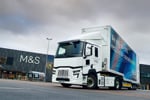Pay-as-you-go is a big no-no
The concept of charging motorists for their road use prompted a barrage of letters from outraged readers
SIR – The idea of a ‘pay-as-you-drive’ system is ludicrous. A round trip to work every day is 30 miles. Is it going to end up costing me a fortune just to get to work?
Depending on the charges put on major roads, it will encourage people to drive through more rural routes, spoiling the countryside and people’s quality of life.
A key problem with British roads is the volume of large trucks from further afield (eg eastern Europe). I recognise that goods have to be transported but think we allow too much to be transported by road. If any restrictions should be made, it should be by forcing goods transport by rail wherever possible.
When I was recently driving on the M25 to and from Kent, you could barely drive in the inside or middle lane because of the volume of trucks. In addition to the congestion, there always appear to be numerous accidents involving trucks, which cause chaos and disruption on major routes and often gridlock secondary roads.
Congestion charging for major cities is a good idea because there is normally a public transport alternative, but in other areas there is often no choice but to use your car.
Investment in rail and public transport would be preferable. Another thing that clogs the roads is drivers doing the school run. This is more of a problem around towns and the volume of traffic declines rapidly during school holidays.
Whatever is decided, the logistics need to be carefully thought through. We have to pay enough taxes on a day-to-day basis, without adding to them. If things are made too bureaucratic in the UK, we might as well all emigrate.
Louise Nutten
Faber
Expensive way to non-achieve
SIR – Maybe I’m missing something, but it seems to me that road pricing is an expensive method of achieving nothing. If the system really is designed to be revenue neutral, it has at least four drawbacks:
The simplest and most effective method of road pricing is to increase fuel tax. There is a disproportionate charge on vehicles with a low mpg performance, but that’s consistent with having an environmental policy.
If we ignore the claim that the tax will be neutral, let’s just accept the increase in fuel tax has to be paid and invest the extra tax revenue in public transport availability, to give us a little bit of carrot to take the train, bus or shared taxi, rather than just using the stick to punish us for using a car.
If the Government is frightened of the country being brought to a standstill by industrial action by the truckers of this world, they can always buy them off with some credit scheme for diesel used for freight purposes.
The satellite route is an overly-complicated and expensive coward’s way of avoiding confrontation.
Pete Stockdale
Managing director, O Elliott
Don’t make our roads like France
SIR – MOST forms of toll charging for roads use rarely produce the results required. I live not far from the bridges which cross the River Severn. Traffic going into Wales (the charging direction) is always lighter than the roads through Gloucester and the Forest of Dean which are clogged with traffic trying to avoid the toll.
Do we want England to end up like France, with traffic-free, toll-charging motorways but heavily-congested, less well-maintained side roads and villages and towns choked with vehicles and pollution? We pay vast sums of money on building our motorways and bypasses, then do all we can to keep people off them.
I understand that the Government makes a lot of money from road haulage so my suggestion will never be considered, but we should encourage long-distance freight to travel by rail with lorry journeys only for final deliveries.
J E Dimmock
Office manager, Nexus
Look to the school run – it’s the main jam culprit
SIR – Most people who drive on Britain’s roads these days have to in order to get to and from work or about their business, and not just for the sake of it.
After all, who really wants to suffer the daily jams and delays on our roads?
Perhaps the Government would be better to target the thousands of parents taking children to and from school on a daily basis. It is remarkable how much traffic is reduced during the school holidays.
What happened to the days when children walked or took arranged school buses?
Have they disappeared as part of a failed Government initiative?
It is obvious who will have to pay for the technology to track the vehicles. The motorist is an easy target as most drivers do not have a choice about whether they drive or not.
Has the Government considered the average man and his journey to work to earn the money, pay taxes and look after his family? Many people have to commute to work because of the lack of jobs locally resulting from the demise of many manufacturing and producing industries.
The Government should invest the resources it will waste in ‘pay-as-you-drive’ in our public transport system.
Julie Barnes
BLP UK















Login to comment
Comments
No comments have been made yet.